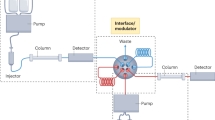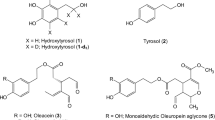Abstract
IT is well known that the application of long-chain fatty acid samples to gas chromatography needs their previous esterification to methyl esters. Speaking generally, there are two ways to obtain such esters: (1) The esterification of the fatty acids with diazomethane, or methanol–hydrochloric acid, after saponification of the lipids and removal of the non-saponifiable compounds. (2) The direct transfer of the fatty acids in ester combination from glycerol to methanol1.
This is a preview of subscription content, access via your institution
Access options
Subscribe to this journal
Receive 51 print issues and online access
$199.00 per year
only $3.90 per issue
Buy this article
- Purchase on Springer Link
- Instant access to full article PDF
Prices may be subject to local taxes which are calculated during checkout
Similar content being viewed by others
References
James, A. T., in Method of Biochemical Analysis, edit. by Glick, D., 8 (Interscience Pub., New York, 1960).
Stoffel, W., Chu, F., and Ahrens, jun., E. H., Anal. Chem., 31, 307 (1959).
Stahl, E., Pharmazie, 11, 633 (1956).
Mangold, H. K., Fette, Seifen, Anstrichmittel, 61, 877 (1959).
Author information
Authors and Affiliations
Rights and permissions
About this article
Cite this article
RUGGIERI, S. Separation of the Methyl Esters of Fatty Acids by Thin Layer Chromatography. Nature 193, 1282–1283 (1962). https://doi.org/10.1038/1931282a0
Issue Date:
DOI: https://doi.org/10.1038/1931282a0
This article is cited by
-
Characterization of complex lipid mixtures in contaminant exposed JEG-3 cells using liquid chromatography and high-resolution mass spectrometry
Environmental Science and Pollution Research (2014)
-
Recent advances of chromatography and mass spectrometry in lipidomics
Analytical and Bioanalytical Chemistry (2011)
Comments
By submitting a comment you agree to abide by our Terms and Community Guidelines. If you find something abusive or that does not comply with our terms or guidelines please flag it as inappropriate.



